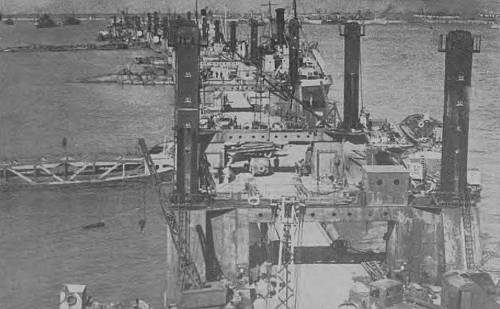- Author
- Smythe, D.H.D., AO, Commodore, RAN
- Subjects
- Biographies and personal histories, History - WW2
- Tags
-
- RAN Ships
- None noted.
- Publication
- March 1975 edition of the Naval Historical Review (all rights reserved)
All this time the shore batteries, particularly those on Le Havre headland and those above Trouville and Deauville to port who were able to enfilade the beaches, were firing steadily. They appeared to divide their attentions equally between the beaches and our own force of bombarding ships and there were some very close misses in amongst our ships. Ramillies, Warspite, Arethusa and the monitor Roberts were replying in kind, and very soon the Huns were all keeping quiet, knowing that their flashes were only drawing our fire. One of their shells, whining over our heads, landed directly aboard an LCT about half a mile ahead. The result was the most complete example of destructive annihilation I’ve ever seen. A blinding flash, a swirl of water, and then nothing but about an acre of fiercely burning oil and wreckage. A great pall of black smoke drifted down-wind, adding itself to the smoke screen made by MTBs, destroyers, and smoke laying aircraft, to obscure us and the beaches from the Havre batteries.
At about 0800 a slight diversion was caused by a small group of E Boats who, rounding Le Havre headland, came through the smoke screen intent on mischief. Their reception, consisting of very accurate fire from Mauritius and a concerted charge by a dozen or so MTBs, so affected them as to cause a very swift turn and a rapid retreat whence they came.
So the day wore on, and still there seemed an almost unbelievable lack of opposition from the enemy. Inland, of course, the army was meeting some fierce fighting, but were still pushing on steadily towards Caen. Our FOB ashore (Forward Observation Bombardment Officer) could apparently find no suitable targets for us inland, so we occupied ourselves by joining in the duel with the Deauville and Trouville Batteries, at which direct bombardment was possible. Sharing one battery at Houlgate with Arethusa and Roberts, we had just achieved a near hit when a salvo from Roberts finished our shoot in that direction. Falling directly on to the target, it produced a most dramatic and complete disintegration of the battery, whose ammunition, exploding at the same time, produced a high column of smoke and flame which was pretty to watch. Shortly before this Ramillies had also scored a direct hit on a large calibre battery further north on the peninsula at Bennerville, so it became obvious that very little more trouble would come from those quarters.
In about the middle of the afternoon the enemy delivered their first and only air attack of the day. Flying in low and fast, three Junkers 88s sped along the beaches, dropping their bombs and firing their cannon, and then zooming away into the clouds hotly pursued by over a dozen Spitfires. I believe these three formed part of a squadron of a dozen, the others of whom attacked the landings west of us, four being brought down by our fighters.

At half past five in the evening, just over twelve hours after our first shot, we received orders to withdraw. The bombardment, together with the RAF heavy bombing, had so lessened the strength of the shore batteries as to allow us to depart, as we had much to do on our return to Portsmouth. So, leaving the rest of Force D still hungrily eyeing the hills for signs of gunfire, and still with an impression that the whole operation had been too good to be true, we left the offshore area and set course northwards at 23 knots. The return journey, accomplished in half the time taken for the outward trip, was uneventful so far as enemy interference was concerned. The channel was even more packed with ships than during the previous night, as there was now a continuous two-way stream – the original assault craft, returning empty for more, and complete new flotillas of craft taking out consolidating troops. As we dropped anchor in the Solent at 2230, I think everyone on board was able, before falling asleep where they stood, to breathe a threefold prayer of thanks. First, that we had successfully accomplished our duty of getting the army ashore, second that we were still unscathed, and third, that we have been able to witness the most inspiring spectacle that is liable to occur in this war.
